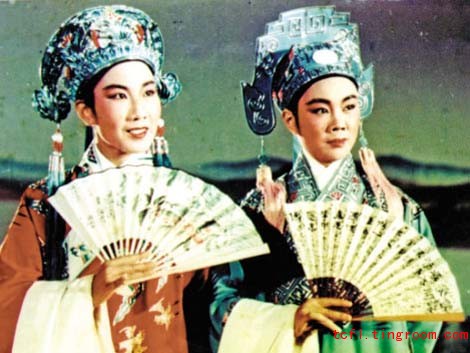
When talking about Yueju (Shaoxing Opera), the famous actress Yuan Xuefen can not be forgotten. Yuan Xuefen (1922- ), the leading reformer in the 1940s, contributed a great deal to the development and enrichment of Yueju.
In the early 20th century, a form of opera called Luodi Changshu Diao was popular in the area of Shengxian County in Shaoxing, Zhejiang Province. It was named "Yue Opera" because it has its origin in part of Yue State in the Spring and Autumn Period dating back about 2,000 years ago. As the performers sang to the accompaniment of a rhythmic didu, didu sound made by a drum and sandalwood clappers, they were also called "Didu troupes". At that time, the most outstanding Didu troupe in Shaoxing consisted of only male performers. In the late 1920s, with the emergence of a large number of female performers, a Didu troupe with only female performers appeared; it was called the Women's Refined Opera. In the autumn of 1938, it formally adopted the name of Yueju.
In the 1950s, a reform of Yueju started, under the influence of Yuan Xuefen. Maintaining its soft, sweet tunes and melodies, and gentle and refined style, Yueju adopted artistic achievements from the modern drama, Kunqu and Western music, in an attempt to create a new performing style. The women artists replaced the Mu Biao system (Each drama used to have only an outline, rather than a script; actors performed as they wished, but within the outline.) with scripts. The operas now had definite directors. A special kind of ancient costume was created, modern stage settings and lights were introduced, and some western musical instruments were incorporated in the orchestra.
Yuan Xuefen's representative works are Sister-in-Law Xianglin, Liang Shanbo and Zhu Yingtai, and Wang Zhaojun. In September 1944, the professional Xue Fen Yueju Troupe was established, and its style is named the Yuan School.
Sister-in-Law Xianglin, performed by leading actress Yuan Xuefen, was adapted from the story New Year's Sacrifice by Lu Xun (1881-1936). As Sister-in-Law Xianglin became a widow twice, people regarded her as an inauspicious woman. After her son has been eaten by a wolf, she is driven insane. On a winter night, she is driven out by her employer, and dies in the snow. However, the story has the optimistic theme of the awakening of the Chinese people.



